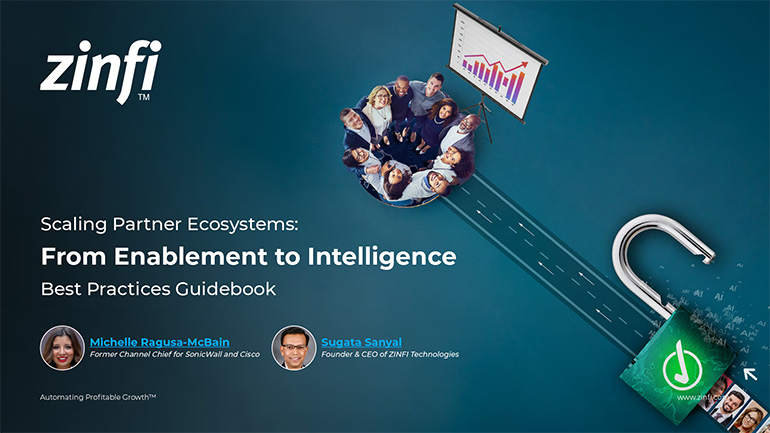Glossary - What is - Channel Ecosystem Tools
What are Channel Ecosystem Tools?
Channel ecosystem tools are software solutions that enable businesses to effectively manage and optimize relationships with their network of channel partners, including distributors, resellers, integrators, and service providers. These tools offer functionalities for partner onboarding, training, lead distribution, co-marketing, performance tracking, and incentive management, all within a centralized platform. Companies can streamline operations, improve collaboration with partners, and drive better sales and marketing outcomes across their partner networks using channel ecosystem tools.
In partner ecosystem management and partner management automation, channel ecosystem tools are essential for scaling partner programs efficiently. These tools automate vital tasks, enhance communication, and provide valuable data-driven insights into partner performance. By leveraging channel ecosystem tools, businesses can ensure alignment between their partners’ activities and broader business goals, which results in higher partner engagement and stronger long-term relationships.
Key Takeaways:
- Automated Partner Onboarding and Training: Channel ecosystem tools streamline onboarding by automating workflows that guide new partners through registration, training, and certification. These tools ensure that partners are adequately trained and equipped with the necessary knowledge and resources to sell and support the company’s products or services. For instance, ZINFI’s partner onboarding tools provide step-by-step guidance that helps partners quickly become proficient and productive within the ecosystem.
- Lead Distribution and Management: Channel ecosystem tools automate the lead distribution process, ensuring that leads are routed to the right partners based on geographic location, expertise, or past performance. This increases the chances of successful lead conversion and improves the overall efficiency of the sales process. ZINFI’s lead management tools allow businesses to track lead progress in real time, ensuring transparency and better alignment between the company and its partners.
- Effective Co-Marketing and MDF Management: Channel ecosystem tools enable businesses to collaborate with partners on co-marketing activities by providing access to Marketing Development Funds (MDF) and pre-approved marketing assets. These tools allow companies to allocate funds, manage joint campaigns, and track their performance, ensuring that marketing efforts align with overall corporate objectives. ZINFI’s co-marketing tools offer a comprehensive solution for managing the co-marketing process, from campaign approval to performance analysis.
- Real-Time Performance Tracking and Analytics: One of the most valuable features of channel ecosystem tools is the ability to monitor partner performance through real-time analytics and reporting. These tools help businesses track Key Performance Indicators (KPIs), such as sales volume, engagement levels, and marketing contributions. ZINFI’s performance management tools offer customizable dashboards that provide insights into partner activities, enabling businesses to identify high-performing partners and offer targeted incentives to improve outcomes.
- Improved Communication and Collaboration: Channel ecosystem tools centralize communication between businesses and their partners, improving collaboration and ensuring that both parties are aligned. These tools allow partners to access product updates, training materials, and marketing resources while enabling real-time communication with channel managers. ZINFI’s collaboration tools help businesses keep their partners informed and engaged, leading to better coordination and stronger relationships within the partner ecosystem. Watch Jay McBain talk about partner collaboration.
Summary of Key Takeaways:
Channel ecosystem tools offer comprehensive features that help businesses manage their partner relationships more effectively. These tools automate critical processes such as onboarding, lead distribution, co-marketing, and performance tracking, allowing companies to streamline operations and improve collaboration with partners. ZINFI’s channel ecosystem tools provide businesses with real-time insights and the ability to manage the partner lifecycle efficiently, leading to increased partner engagement, better sales performance, and stronger long-term partnerships.
Key Examples:
- Automotive Manufacturing: In the automotive industry, channel ecosystem tools help manufacturers manage dealership relationships by automating lead distribution and tracking dealership performance. These tools also support co-marketing efforts by enabling manufacturers to collaborate with dealerships on joint marketing campaigns, ensuring that new vehicle models are promoted effectively and consistently across regions.
- Consumer Electronics: Consumer electronics companies use channel ecosystem tools to manage relationships with retailers and resellers. These platforms allow businesses to distribute leads, allocate marketing development funds, and provide partners with access to product information and marketing resources. Performance tracking ensures that partners meet sales targets and that marketing efforts align with corporate goals.
- Energy Production: Energy companies rely on channel ecosystem tools to manage relationships with contractors, distributors, and installers of renewable energy solutions. These tools streamline onboarding and training for new partners, distribute project leads, and track partners’ performance in promoting energy-efficient technologies. By automating these processes, energy companies can enhance collaboration with their partners and promote sustainability initiatives.
- Financial Services: Companies use channel ecosystem tools in financial services to manage relationships with brokers, agents, and financial advisors. These platforms enable financial institutions to distribute leads based on partner expertise, provide compliance training, and track the performance of sales agents. Channel ecosystem tools, such as commission structures, also allow businesses to manage incentive programs based on partner performance.
- Food and Beverage: Channel ecosystem tools help food and beverage companies manage distributor and retailer relationships by automating co-marketing campaigns and tracking sales performance. These tools ensure that distributors have access to promotional materials and product information while also enabling businesses to monitor and reward top-performing partners with incentives based on sales volume and other metrics.
- Healthcare Services: Healthcare providers and pharmaceutical companies use channel ecosystem tools to manage relationships with medical distributors, practitioners, and pharmacies. These platforms streamline partner onboarding and training, ensuring compliance with regulatory requirements. Healthcare companies can also use channel ecosystem tools to track partner performance, monitor sales activities, and manage incentive programs for top-performing partners.
- Information Technology: In the IT sector, channel ecosystem tools are essential for managing relationships with resellers, system integrators, and Managed Service Providers (MSPs). These tools automate lead distribution, provide partners with access to training on new software or hardware products, and track sales performance. IT companies can also use channel ecosystem tools to collaborate with partners on co-marketing campaigns, ensuring that marketing activities align with product launches and corporate strategies.
- Pharmaceutical Development: Pharmaceutical companies use channel ecosystem tools to manage relationships with distributors and healthcare providers. These platforms help companies onboard new partners, provide compliance training, and track the performance of their sales activities. Using channel ecosystem tools, pharmaceutical companies can ensure that their products are promoted effectively across regions and that partners meet regulatory requirements.
- Retail Industry: Retailers use channel ecosystem tools to manage vendor relationships and streamline supply chain operations. These tools provide vendors with access to sales data, marketing resources, and promotional materials, allowing them to promote their products effectively. Retailers can also track vendor performance and manage joint marketing efforts, ensuring marketing strategies align with business objectives.
- Telecommunications: Telecommunications companies use channel ecosystem tools to manage relationships with service providers, distributors, and technology partners. These platforms automate lead distribution, track partner sales performance, and execute joint marketing campaigns. Telecom companies can also use these tools to provide partners with training and support, ensuring they can sell complex telecom services like mobile plans or internet packages.
Conclusion:
Channel ecosystem tools are essential solutions for businesses that rely on channel partners to expand their market presence and drive sales growth. These tools automate vital processes such as onboarding, lead distribution, co-marketing, and performance tracking, helping businesses manage their partner relationships more effectively. Using channel ecosystem tools, companies can improve collaboration, increase partner engagement, and ensure their partners align with corporate objectives.
Channel ecosystem tools are widely used across automotive, IT, healthcare, and telecommunications industries. These tools help businesses optimize channel strategies by providing a centralized platform for managing partner activities. ZINFI’s channel ecosystem tools offer a comprehensive solution for managing the partner lifecycle, enhancing communication, and driving long-term growth through improved partner collaboration and performance tracking.
Associated Keywords:
- Channel Ecosystem Software
- Partner Management Tools
- Channel Partner Solutions















